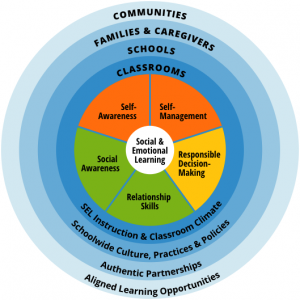TL;DR:
- Struggling through depression made me feel lost and alone.
- Remote learning started to help me heal and become myself again.
- SEL is important for adults, too.
I have been meaning to find a way to settle down to write this blog.
It has taken me some time to overcome my own anxiety issues, both personal and professional. After my father’s death in 2012, I was able to accept his passing by continuing to make him proud of me. He taught me how to be strong, and he taught me how to stick to my beliefs. What he could not teach me was how to handle life when he is gone.
While I was dealing with his death, I found out that I was the target of lies. These lies were not the truth; I struggled silently for quite a few years. The silence held my negativity inside while my soul slowly was dying. This led me into a depression that I did not know existed; however, I did not tell anyone how I felt. I just wanted my brain to be mush just so my eyes would close at night.
If we do not take care of ourselves, no one else will. Share on XAfter being harassed, misjudged, and losing my “friends,” it was hard for me to trust anyone. I let this put fear into me and stopped being who I am. But worst of all, I let it control me. Friends come and go, this I understood. But what hurt the most is that the lies overcame their views of me.
Professionally, I was looked down upon. No one ever admitted it, but I saw it in their eyes. Whenever anything “good” happened to me, it was short-lived. I started to feel I did not belong anymore. All I wanted was to change the lives of my students and stick to what my dad taught me: not to give up.
My Own SEL
For eight long years, I became someone who I hated on the inside and out. But being remote (eLearning) started to save me. I know this is not the best way for students to learn and educators to teach. But this is what I needed to regain who I was. While there were other “minor” drawbacks to being at home, my anxiety and stress level decreased in just six weeks. I cannot say that all is normal, but I am starting to like myself again. I found the time to work out, I was not “crabby” at home, and I spent more time doing things instead of lying around the house.
Despite the numerous surgeries and procedures the past two years, I found myself back at the gym working out to feel good, riding my bike mile after mile, eating healthier, and being with the ones who will continue to push me to be better than I was yesterday.
But it starts with me.
[scroll down to keep reading]Casel’s SEL Framework
After studying the SEL framework, I know there are some areas that still need to be improved upon. There are five levels to the Social Emotional Learning (SEL) framework.
Self-awareness
The ability to accurately recognize one’s emotions and thoughts and their influence on behavior. This includes accurately assessing one’s strengths and limitations and possessing a well-grounded sense of confidence and optimism.
Self-management
The ability to regulate one’s emotions, thoughts, and behaviors effectively in different situations. This includes managing stress, controlling impulses, motivating oneself, and setting and working toward achieving personal and academic goals.
Social awareness
The ability to take the perspective of and empathize with others from diverse backgrounds and cultures, to understand social and ethical norms for behavior, and to recognize family, school, and community resources and supports.
Relationship skills
The ability to establish and maintain healthy and rewarding relationships with diverse individuals and groups. This includes communicating clearly, listening actively, cooperating, resisting inappropriate social pressure, negotiating conflict constructively, and seeking and offering help when needed.
Responsible decision-making
The ability to make constructive and respectful choices about personal behavior and social interactions based on consideration of ethical standards, safety concerns, social norms, the realistic evaluation of consequences of various actions, and the well-being of self and others.
We all need to find time to set aside for ourselves. If we do not take care of ourselves, no one else will. When you start to feel lethargic or lack of energy to do anything, it’s time to take that step back. We are not irreplaceable. Let’s not worry about what can be done tomorrow when we need to take care of ourselves today.
References
Collaborative for Academic, Social, and Emotional Learning (CASEL). CASEL. 2020. https://casel.org/what-is-sel/.
About Kristen Koppers
Kristen is a blogger, presenter, self-published author, and high school educator as well as an adjunct teacher at the local junior college. She has been teaching for more than fifteen years and is currently teaching high school English in Illinois. She is a Google Certified Educator and National Board Certified Teacher. Kristen has a master’s degree in English and a second in Education Administration.
Kristen wrote the book Differentiated Instruction the Teacher Profession as a way to share her ideas of how to use Differentiated Instruction inside the classroom. As an educator, it is important to find innovative ways to meet the needs of her students. Kristen is often on Twitter (@Mrs_Koppers) participating in chats and collaborating with other educators. It’s easy to share DI ideas on Twitter (#DITeaching).




